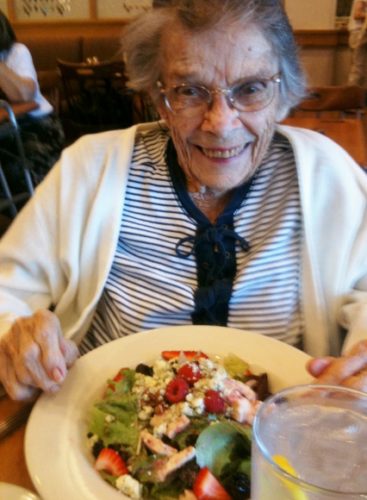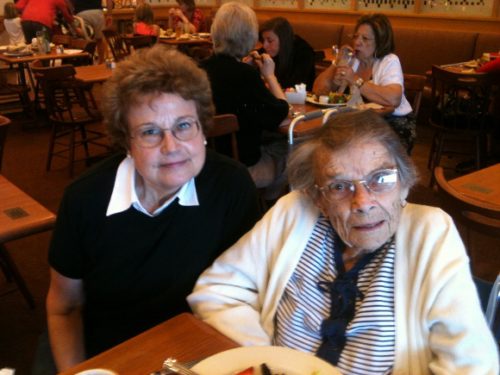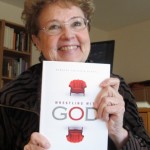
My mother died five winters ago. As her death approached, I imagined a poignant death-bed scene like the ones in the movies — her family gathered around, holding her hands and leaning in to hear her last words, something meaningful, of course. If you read the obits, after all, it seems that everybody’s mother or father gets to “die peacefully at home surrounded by loving family.”
Didn’t happen. My mother’s last words to me were nothing much. No parting words of love. No heartfelt messages to the grandchildren.
It went like this: Two days before she died, as I was about to leave her hospital bedside, I told my mother I’d take her to lunch at our favorite lunch spot the following week. Her voice was weak, but she smiled gamely and retorted, “I’ll pay.”
A day later, on the night before she died, she lay in bed with her head propped up on pillows eating a little soup with help from a caregiver at her assisted living residence. When the caregiver left the room, my mother turned her head on her pillows and said, “Get me some water, would you, Barb?”
No please. No thank you. Just a matter-of-fact, “Get me some water, would you, Barb?”
In the weeks following my mother’s death, I often felt short-changed by our last moments together. She’d died a few days before the winter solstice. And during these dark winter months, I’d feel sadness, guilt even, that I failed to make our last days and hours together more meaningful, more profound, holier, for her – and for me.
In the years since, however, on trips to the mall, I’ve made a point of stopping in at our favorite cafe and have a memorial lunch in honor of my mother. I’ll order the
chicken salad with blue cheese, sugared walnuts and fresh berries, the salad my mother always ordered when we lunched there together.
Sitting there, with my mother’s blackberries and strawberries before me, I’ve come to realize how much of my mother – and me – there actually was in those words, “I’ll pay.” We had both laughed when she offered to pick up the check, because, as the elder in our twosome, that’s what she’d always done. We laughed at how predictable we were. We laughed at how much we relished being predictable. My mother’s words, “I’ll pay,” reminded us both of the good times we’d had at our mother-daughter lunches over the years since I was a teenager — no husbands, no brothers, just two pretty ladies out on the town.
On the day she died, my mother was too weak to speak. And so her matter-of-fact, “Get me some water, would you, Barb?” turned out to be the very last words I’d hear from her. I think about those words as I eat the blackberries and walnuts. And I find that, in fact, I am satisfied with them, with their familiarity, their straightforwardness, with the fact that no “please” was offered or expected.
Tucked away in my mother’s quiet request to me on the night before she died was a message as simple as it was profound: “You’re my daughter and I’m your mother and that’s that.”
Over the years, I’ve come to understand that we don’t get to have a perfect death, any more than we get to have a perfect life. That’s not what is given to us. What we are given is a life — a life full of small moments, some of them bleak.
The winter solstice is behind us now. The days are getting longer again, and the sky less dark.
A version of this post first appeared on BarbaraFalconerNewhall.com, where Barbara riffs on life as an empty nest mom — and expectant grandmother. Read about the challenge of writing about her mother at “Write About My Aging Mother? I Don’t Think So.” You might also like “Donald Trump and Pope Francis: Two Voices — One Loud, One Powerful.”
Her book, “Wrestling with God: Stories of Doubt and Faith,” is available from Patheos Press.













